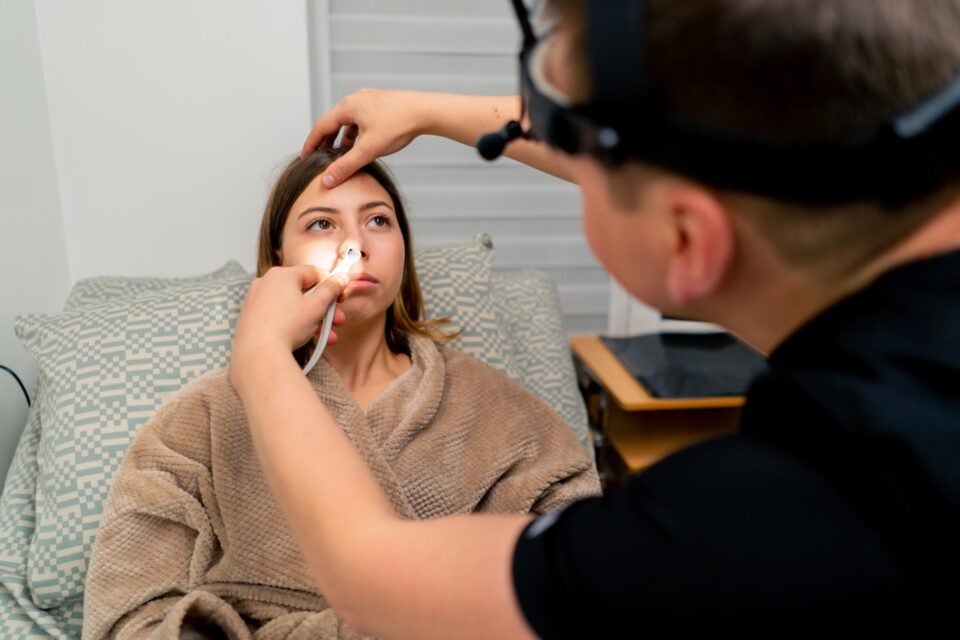Deviated Septum Treatment in Surprise, AZ
Understanding Your Deviated Septum in Surprise, AZ
Breathing comfortably is vital for a good quality of life, but many individuals unknowingly deal with challenges caused by a deviated septum. At Oasis ENT, we’re here to help you understand how a deviated septum impacts your nasal health and the effective solutions available that may help improve comfort and ease in your daily life, depending on your condition.

Common Symptoms of a Deviated Septum
A deviated septum can disrupt breathing and cause lingering discomfort. Recognizing the symptoms is the first step to seeking relief. Here are the most common symptoms of a deviated septum:
- Nasal Congestion: Persistent nasal congestion can make breathing difficult through one or both nostrils. This not only causes discomfort but also interrupts clear airflow.
- Snoring and Sleep Issues: A deviated septum may lead to noisy breathing during sleep due to restricted airflow, disrupting rest for you and your partner.
- Frequent Sinus Infections: Altered airflow can cause sinus blockages, increasing the risk of recurrent infections and related inflammation.
What Causes a Deviated Septum?
The septum is the thin wall that separates your nasal passages. It can impact airflow and overall nasal function when it becomes significantly displaced to one side. Common causes include:
- Congenital Conditions: Some individuals are born with a deviated septum due to developmental factors before birth.
- Trauma or Injury: Accidents or injuries, such as a broken nose, can shift the septum and disrupt its alignment.
- Aging and Structural Changes: Age-related changes in nasal structure may lead to a gradual septal deviation.
Treatment Options for a Deviated Septum
Treating a deviated septum depends on the severity of symptoms and how much they interfere with your quality of life. Learn more about different treatment options:
Non-Surgical Treatments
Some individuals manage mild symptoms with non-surgical options such as:
- Decongestants: Reduce nasal swelling and improve airflow.
- Nasal Corticosteroid Sprays: Minimize inflammation for temporary relief.
- Antihistamines: Address allergy symptoms that exacerbate nasal blockages.
Surgical Option: Septoplasty
For those with severe symptoms, deviated septum surgery, known as septoplasty, may be recommended. This outpatient procedure includes realigning the septum to improve airflow and alleviate discomfort. During the surgery:
- Incisions are made inside the nose to access and reposition the septum.
- Many patients report improved nasal function and breathing comfort after recovery, though outcomes vary by individual.
- While recovery may include temporary swelling or congestion, septoplasty is performed with the goal of providing lasting relief by correcting structural issues in the nasal passages.
At Oasis ENT, our experienced team specializes in delivering precise, minimally invasive surgical care designed to improve nasal function and breathing comfort.
Common FAQs
- How to know if you have a deviated septum?
Frequent nasal congestion, difficulty breathing, or sinus issues could be signs of a structural issue like a deviated septum. A professional examination, which may involve a nasal endoscope, will provide a proper diagnosis.
- Is deviated septum surgery painful?
During septoplasty, patients receive anesthesia to ensure the procedure is pain-free. While you may experience mild discomfort during recovery, this can be effectively managed with post-operative care.
- How long does it take to recover from septoplasty?
Most individuals recover within 1–2 weeks. Temporary congestion or swelling is common, but breathing improvement often becomes noticeable shortly after recovery.
- Can a deviated septum worsen over time?
Yes, age-related changes or repeated nasal trauma can lead to increased septal deviation, worsening symptoms like congestion and sinus infections.
Take Control Of Your Breathing
If a deviated septum is affecting your comfort, treatment options are designed to improve breathing and support better day-to-day comfort. At Oasis ENT, we’re dedicated to helping you find relief with advanced treatment options, including non-invasive therapies and ENT surgical care tailored to your needs. Take the first step toward improving your breathing—schedule an appointment today. Individual results may vary.
Disclaimer: Treatment outcomes vary by individual. This information is for educational purposes only and does not constitute medical advice. Always consult a licensed healthcare provider to determine the best course of care for your specific condition.
